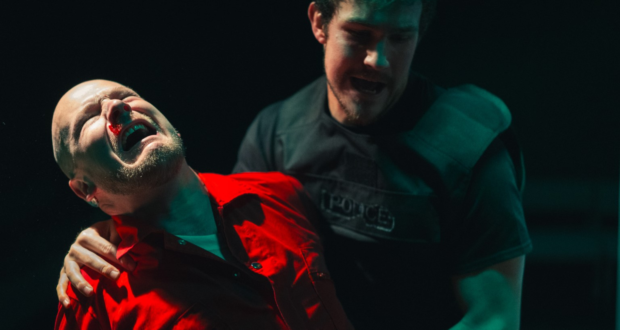A dystopian drama with interesting themes but unclear objectives, elevated by excellent performances and direction.Summary
Rating
Good
A cage stands centre stage at the Lion and Unicorn Theatre, with a blindfolded man lying on its floor. Subdued auditorium lighting emphasises the presence of technology displaying images of body scans, data charts, while the tension is elevated by an intimidating electronic soundtrack. These are the elements supporting the Shatterbox: “A device for mechanically pulverizing a sample of material, used by scientists”, as Proforça Theatre’s website explains.
The man in the cage – Knight (Kieran Dee) – is the sample in this case. He is there because he has a deep secret which he must disclose in order to be released from the facility, but he doesn’t know what that secret is, only that he will be destroyed if he doesn’t reveal it. It’s not made clear who is keeping him there, but he undergoes a torturously dehumanising process intended to force his compliance and confession.
Dee is tremendous as the tormented prisoner, filled with vitriol initially, then manipulative and intelligent, before descending into passionate trauma. His overseer is played chillingly dispassionately by Dodie Finamore, whilst Melissa Phillips is the measured, insidious voice of the computer system that has ultimate control over everything. Then there’s an excellent ‘bad angel/good angel’ double act from Nick Hardie as Castle, the thuggish guard, and Alex O’Donell as Bishop, the carer who knows she’s not really caring at all. O’Donell is a standout, bringing a perfect balance of empathy and guilt to her character, and it’s hard to believe this is her debut professional performance.
We’re not given names for the characters (these are listed in the programme), which in itself is dehumanising, but as James Lewis’ layered writing cleverly gives each of them (with the exception of the computer) a slight backstory they become relatably human. This humanity is where the show is at its most interesting, as ideas of personal integrity, responsibility and above all moral choice are identified and challenged. As at the Nuremburg Trials, the idea that “I was acting under orders” is shown to be utterly inexcusable.
David Brady’s direction is meticulous throughout, adding subtle considerations of time and space that emphasise the repetitive possibilities of the brutal events depicted. The characters occasionally sit amongst us, testing our complicity in their attitudes, which is highly entertaining when the audience members beside them are challenged on the spot.
The script is starkly influenced by recognisable styles, with hints of Kafka’s The Trial, some George Orwell and even a bit of Star Trek thrown in, making it darkly dystopian. Yet, in some ways this works against the whole, as with only partial elements of each already familiar style and without any distinctly novel additions, its objective is clouded. Many questions are thrown up by the writing, which are engaged with only suggestively; themes of the human relationship with technology, with data gathering and AI, ideas of government or institutional control over the individual. But these are not explicitly identifiable commentaries on contemporary or even historical events, so ultimately the whole feels conceptual and the point of it all is nebulous. However, an unexpected occurrence at the close of the show brings a decisive twist that surprisingly lifts the conclusion.
Despite its rather unfocussed message, The Shatter Box does provide a platform from which to think outside of the box: to take prompts from its themes and consider where they apply in today’s society. Buoyed up by some excellent performances, direction and tech, this is certainly a thought-provoking piece of work.
Written by: James Lewis
Directed by: David Brady
Produced by: Proforca Theatre Company
The Shatterbox plays at the Lion and Unicorn Theatre until Saturday 16 September. Further information and bookings can be found here.
 Everything Theatre Reviews, interviews and news for theatre lovers, London and beyond
Everything Theatre Reviews, interviews and news for theatre lovers, London and beyond



